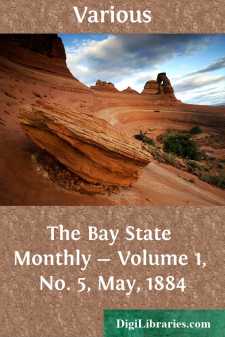Categories
- Antiques & Collectibles 13
- Architecture 36
- Art 48
- Bibles 22
- Biography & Autobiography 813
- Body, Mind & Spirit 142
- Business & Economics 28
- Children's Books 17
- Children's Fiction 14
- Computers 4
- Cooking 94
- Crafts & Hobbies 4
- Drama 346
- Education 46
- Family & Relationships 57
- Fiction 11829
- Games 19
- Gardening 17
- Health & Fitness 34
- History 1377
- House & Home 1
- Humor 147
- Juvenile Fiction 1873
- Juvenile Nonfiction 202
- Language Arts & Disciplines 88
- Law 16
- Literary Collections 686
- Literary Criticism 179
- Mathematics 13
- Medical 41
- Music 40
- Nature 179
- Non-Classifiable 1768
- Performing Arts 7
- Periodicals 1453
- Philosophy 64
- Photography 2
- Poetry 896
- Political Science 203
- Psychology 42
- Reference 154
- Religion 513
- Science 126
- Self-Help 84
- Social Science 81
- Sports & Recreation 34
- Study Aids 3
- Technology & Engineering 59
- Transportation 23
- Travel 463
- True Crime 29
The Bay State Monthly - Volume 1, No. 5, May, 1884
by: Various
Categories:
Description:
Excerpt
CHESTER ALAN ARTHUR.
By Ben: Perley Poore.
Chester Alan Arthur was born at Fairfield, Vermont, October 5, 1830. His father, the Reverend Doctor William Arthur, was a Baptist clergyman, who emigrated from county Antrim, Ireland, when only eighteen years of age. He had received a thorough classical education, and was graduated from Belfast University, one of the foremost institutions of learning in Ireland. Marrying an American, Miss Malvina Stone, soon after his arrival, he became the father of several children. Chester was the eldest of two sons, having four sisters older and two younger than himself. While fulfilling his clerical duties as the pastor, successively, of a number of Baptist churches in New York State, Dr. Arthur edited for several years The Antiquarian, and wrote a work on Family Names, which is highly prized by genealogists. Of Scotch-Irish descent, he was a man of great force of character, impatient of restraint, at home in a controversy, and frank in the expression of his opinions. He was a pronounced emancipationist, although he never expected to see the overthrow of slavery, which it was his good fortune to witness, as his life was spared until the twenty-seventh of October, 1875, when he died at Newtonville, near Albany. He was a personal friend of Gerrit Smith, and they had participated in the organization of the New York State Anti-Slavery Society, which was dispersed by a mob during its first meeting at Utica, on the twenty-first of October, 1835 (the day on which William Lloyd Garrison was mobbed in Boston, and was lodged in jail for his own protection). A friend of the slave from conscience and from conviction, Dr. Arthur was never backward in expressing his convictions, and his children imbibed his teachings.
When a lad, young Arthur enjoyed at home the tutelage of his father, whose thorough knowledge of the classics enabled him to lay the foundation of his son's future education broad and deep. He entered Union College in 1845, when only fifteen years of age. His collegiate course was full of promise, and every successive year he was declared to be one of those who had taken "maximum honors," although he was compelled to absent himself during two winters, when he taught school to earn the requisite funds for defraying his expenses, without drawing upon his father's means. Yet he kept up with his class, and when he was graduated in 1848, he was one of six out of a class of over one hundred, who were elected members of the Phi Beta Kappa, an honor only conferred on the best scholars.
[pg 266]
Following the natural inclination of his mind, young Arthur began the study of law, supporting himself by teaching and by preparing boys for college. It so happened that two years after he was the preceptor of an academy at North Pownal, Vermont, a student from Williams College, named James A. Garfield, came there and taught penmanship in the same academy for several months.
In 1853, young Arthur went to New York City, by the invitation of the Honorable Erastus D....












